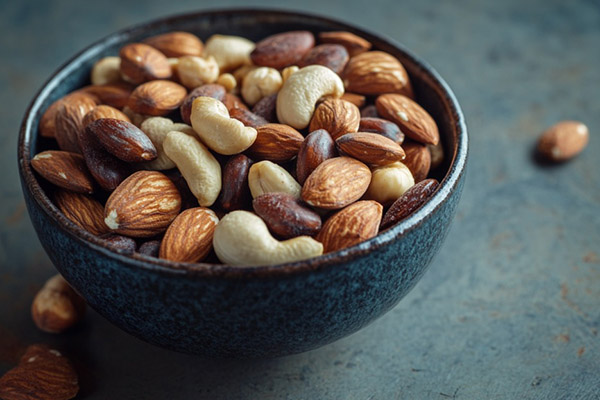MADE IN THE USA | NATURAL, NON-GMO, DAIRY FREE & GLUTEN FREE | FREE SHIPPING IN THE USA
Does zinc make you grow taller?
- What is zinc?
- Does Zinc Make You Grow Taller? Scientific Insights
- How about other factors affecting height?
- Zinc Deficiency and Stunted Growth: What You Need to Know
- How Much Zinc Do You Need for Healthy Growth?
- How to increase zinc intake?
- Should You Take Zinc Supplements to Grow Taller? Expert Advice
- In the end,
Zinc's role in immune system performance is well-documented, with studies linking adequate levels to reduced inflammation and enhanced resistance to infections. It also influences absorption rates of other dietary minerals, such as iron and copper, and contributes to hormonal balance and sensory perception, including taste and smell. According to the National Institutes of Health, daily zinc intake recommendations range from 8 mg for adult women to 11 mg for men. In cases of mineral deficiency or increased physiological demand, zinc supplements may be used under medical guidance. Without sufficient zinc, the body’s capacity to heal, defend against pathogens, and regulate cellular activities significantly declines.
What is zinc?
Zinc is an essential mineral for over 300 enzyme systems in the body, including the immune system, thyroid function, wound healing, senses of taste and smell, and wound healing. This nutrient also aids normal growth and development, especially for pregnant women, kids, and teens.
But, how much is enough for the body?
|
Stage of life |
Recommended daily (mg per day) |
|
0 to 6 months |
2 |
|
7 to 12 months |
3 |
|
1 to 3 years |
3 |
|
4 to 8 years |
4 |
|
9 to 13 years |
6 |
|
Males (14 to 18 years) Females (14 to 18 years) |
13 7 |
|
Adult males |
14 |
|
Adult females |
8 |
|
During pregnancy |
10 to 11 |
|
During breastfeeding |
11 to 12 |
Remember that getting an adequate amount of zinc (not too little or too much) is vital because:
-
Taking too little might result in hair loss, eye and skin issues, loss of appetite, delayed sexual development in teens, and diarrhea.
-
Meanwhile, taking too much might bring some symptoms like headaches, nausea and vomiting, diarrhea, and abdominal cramps.
Now, you know why zinc plays a role in biological processes, including cell growth, metabolism, and differentiation. So, let’s turn back to whether consuming zinc can help support your height. The answer will be revealed below with scientific evidence.

Does Zinc Make You Grow Taller? Scientific Insights
Zinc plays a crucial role in promoting linear growth and preventing stunting, especially in children and adolescents with zinc deficiency. Clinical data from multiple randomized controlled trials confirm that zinc supplementation is linked to increased growth velocity and height gain. A 2018 meta-analysis published in Nutrients (PubMed ID: 30115875) reviewed 36 studies and concluded that zinc supplementation significantly improved height in children under 5 years old, especially in regions with high deficiency rates. These results suggest that zinc helps height by enhancing cellular replication, bone matrix development, and endocrine signaling—critical processes in early growth phases.
Zinc bioavailability and serum zinc levels are key indicators in determining supplementation outcomes. Controlled studies show that when zinc is administered as part of micronutrient interventions—often alongside iron and vitamin A—there is a measurable improvement in height-for-age Z scores. A 2020 review in The American Journal of Clinical Nutrition reinforced this, citing consistent improvements in linear growth among zinc-supplemented groups in low- and middle-income countries. However, the effect is more pronounced in zinc-deficient populations, suggesting targeted interventions yield the best outcomes. While zinc is not a standalone solution for increasing height, its role in growth pathways is scientifically supported through decades of data. For those searching terms like “zinc height study,” “zinc growth proof,” or “zinc supplementation results,” current research provides strong biological and clinical evidence.
How about other factors affecting height?
Genetics
Our genetic setup acts as the initial map, setting the groundwork for our potential height. Research also points out that genetic factors can account for between 60 and 80% of the variation in size. Variations in certain genes, including those related to bone development and growth hormone production, contribute to how short or tall a person might become.
Nutrition
Nutrition creates the foundation of physical development, including height. A healthy and balanced diet with protein, vitamins, minerals, and enough calories is essential for optimal growth. Meanwhile, malnutrition during critical growing years can lead to stunted growth and short stature.
Physical activities
If genetics and nutrition help fuel growth, regular exercise is described as a stimulant. When you are in the growth period, engaging in physical activities like stretching and weight-bearing exercises can support bone health, overall growth, and stature, impacting height potential positively.
Sleep
When we sleep, the release of thyroid-stimulating hormones and growth hormones, which are necessary for proper growth and development, is increased. But if we do not get enough sleep, these hormones will be suppressed while the level of stress hormones are increased, affecting our growth.

Zinc Deficiency and Stunted Growth: What You Need to Know
Zinc deficiency is a leading cause of impaired growth and stunted height in children, especially in low- and middle-income countries where dietary insufficiency and undernutrition are widespread. According to WHO data, nearly 17% of the global population is at risk of inadequate zinc intake, contributing to millions of cases of growth retardation and child development delays. Zinc is essential for cellular division, skeletal growth, and immune function. When deficient, it directly disrupts growth hormone activity and tissue repair—core biological processes required for linear height increase.
The clinical symptoms of zinc deficiency include growth faltering, immune suppression, delayed wound healing, and increased susceptibility to infections. In children, even moderate zinc depletion can result in permanent height loss. Studies show that children with chronic micronutrient deficiency exhibit up to 20% lower growth velocity compared to peers with adequate zinc levels. Deficiency diagnosis often requires serum zinc testing, especially in regions with high stunting prevalence. Addressing zinc and stunting as a public health concern requires targeted nutrition interventions, food fortification, and education about zinc-rich diets to break the cycle of malnutrition and deficiency-related height problems.
How Much Zinc Do You Need for Healthy Growth?
Zinc plays a critical role in growth, immune function, and cellular repair, with the Recommended Dietary Allowance (RDA) varying significantly by age and gender. According to the National Institutes of Health (NIH), infants aged 0–6 months require 2 mg/day, while children aged 4–8 years need 5 mg/day. In adolescence, demands increase: boys aged 14–18 years require 11 mg/day, and girls of the same age need 9 mg/day. These values reflect the Dietary Reference Intakes (DRI) developed by the Food and Nutrition Board and are intended to support normal growth and development, particularly during rapid growth phases in childhood and puberty. Adults maintain similar requirements, with men needing 11 mg/day and women requiring 8 mg/day.
Exceeding the Tolerable Upper Intake Level (UL)—set at 40 mg/day for adults—can lead to over-supplementation, interfering with copper absorption and immune function. Supplementing zinc for height or growth must align with RDA guidelines, especially in children and teens where micronutrient balance is critical. Zinc absorption is enhanced by animal proteins but can be hindered by phytates found in whole grains and legumes. For individuals with higher needs—such as those with malabsorption conditions or on restrictive diets—zinc supplements may be considered under medical supervision. Always align zinc dosage with age-specific needs to support healthy growth without risking nutrient imbalances.
How to increase zinc intake?
Best sources of zinc
-
Seafood is the top choice for getting the most zinc for your diet. Oysters are particularly rich with more than 22 mg of zinc. Also, you can consume crab, shrimp, or mussels.
-
Beef and pork is a good source of zinc. 3 oz of roasted bottom sirloin contains 3.8 mg while 3 oz of broiled center loin has 1.9 mg.
-
Chicken and turkey also provide zinc together with vitamins B6 and B12, which support carbohydrate metabolism and red blood cell production. 3 oz of roasted turkey breast contains 1.5 mg of zinc while rotisserie chicken thigh has 1.4 mg of zinc.
-
Nuts and seeds are not only rich in zinc but also in omega-3 fatty acids, antioxidants, and fiber. Here are some good sources you should add to your diet, including hemp seeds (2.9 mg per 3 tablespoons), pumpkin seeds (2.2 mg per 1 oz), pine nuts (1.8 mg per 1 oz), chia seeds (1.2 mg per 1 oz) and pecans (1.2 mg per 1 oz).
-
Fortified cereals, such as breakfast cereals, can be good and easy sources of zinc. Choose cereals low in sugar to avoid a blood sugar spike in the morning.
-
Fungi like shiitake mushrooms have a good amount of zinc, with 1.9 mg.
Tips to include more zinc-rich foods
If you eat scrambled eggs in the morning, add handfuls of walnuts or almonds as a snack and replace chips with a mix of oilseeds. Also, you can mix your salads, smoothies, or yogurt with chia, sesame, pumpkin, or sunflower seeds. Add a serving of shrimp or grilled chicken breast to your pasta dishes to boost your zinc intake. Or serve a lentil stew with brown rice or a chickpea quinoa salad.
Consider cooking methods like roasting nuts and seeds to enhance flavor and maintain zinc content for the dish.
Zinc supplements – necessary or not?
These have been proven helpful when given to children suffering from zinc deficiency. However, remember to consult your doctor before giving any supplement to your kids.
Should You Take Zinc Supplements to Grow Taller? Expert Advice
Zinc plays a vital role in human growth, especially during childhood and adolescence, but supplementation should only be considered under medical supervision. Zinc supports cell growth, immune function, and hormone production—functions that are critical during growth spurts. Clinical studies suggest that zinc deficiency correlates with stunted height in children; however, this does not mean zinc pills for height will work for everyone. According to pediatric recommendations, dietary strategies should always be prioritized first. Natural food sources like beef, lentils, pumpkin seeds, and fortified cereals offer higher bioavailability and balanced nutrient profiles compared to synthetic zinc capsules.
Zinc supplementation becomes justified only in cases of medically confirmed deficiency, and inappropriate use can lead to toxicity. High doses—often found in over-the-counter supplement brands without medical approval—can interfere with copper absorption and disrupt nutrient balance. The tolerable upper intake level for adolescents is 34 mg/day; exceeding this increases the risk of nausea, immune dysfunction, and chronic overuse dangers. Differences in absorption rates between zinc gluconate, zinc sulfate, and organic forms also affect efficacy and safety. A 2020 meta-analysis in Nutrients emphasizes that while zinc supplements may marginally support linear growth in deficient children, unsupervised use carries more risk than benefit. Always consult a pediatrician before using any form, including zinc capsules marketed for height gain, to ensure safe zinc usage and avoid misleading claims found in many zinc supplement reviews.
In the end,
Zinc is an indispensable mineral for our body, but its impact on the peak is not evident. Although improvements might be stunted through a zinc deficiency, ingesting greater zinc does not make you grow taller. A balanced diet with foods rich in zinc and other nutrients is important for growth. Also, getting enough sleep and engaging in regular exercises play a role.
Related post:

